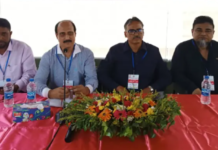
Ha-Meem Group, a leading textile producer and garment exporter, has been unable to run production in its mills and factories at night over the last one and a half months because of a crisis of gas.
AK Azad, chairman and chief executive officer of the group, said production in the spinning section alone had fallen by 50 per cent per month, which in terms of sales revenue amounted to Tk 2.5 crore.
On the other hand, Azad also cannot make a profit from the sale of yarn from imported cotton whose price was already high.
As a result, Azad is in doubt whether he would be able to achieve his export target at the end of the current fiscal year.
Last year he exported garment items worth $800 million. This year he apprehends achieving 20 per cent less than what he has targeted to export, which would not fare well for his 75,000 workers.
Azad was addressing a seminar organised by the Bangladesh Chamber of Industries (BCI) at The Westin Dhaka on mitigation of the impact of the energy crisis on the industrial sector.
Businesspeople from different sectors, chamber and trade body leaders, exporters and experts participated in the seminar.
Azad demanded that the government divert five per cent of the gas used in households to keep production running in industrial units.
Like Azad, other owners of industrial units and leaders of different trade bodies also demanded adequate supply of gas as soon as possible for the continuation of production in industries.
Mohammad Ali Khokon, president of Bangladesh Textile Mills Association, said the production cost of a kilogramme of yarn had crossed $2.30 whereas it was $1.25 when gas supplies were normal.
If there is adequate gas supply, it will be possible to achieve the merchandise export target of $60 billion this fiscal year, he said.
Md Saiful Islam, president of the Metropolitan Chamber of Commerce and Industry, said production cost of the industrial sector had risen anywhere from 10 per cent to 35 per cent because of the gas shortage.
Md Jashim Uddin, president of the Federation of Bangladesh Chambers of Commerce and Industry, said many small and medium factories of Savar have already been shut down as they cannot continue production because of the gas crisis.
Mahbubul Alam, president of the Chittagong Chamber of Commerce and Industry, suggested exploring for gas in the Bay of Bengal.
Md Akhter Hossain Apurbo, director of the Bangladesh Knitwear Manufacturers and Exporters Association, said profits from the sale of knitwear items fell to almost zero because of a five per cent rise in production cost from the shortage of gas.
So, the government can at least withdraw the 15 percent VAT on the import of furnace oil to meet the immediate demand for fuel in the industrial sector, he said.
Shwapna Bhowmick, regional director for Bangladesh and India for Marks & Spencer, said she visited 27 supplier factories over last two months but her experience was not good as productivity had fallen significantly due to the gas supply shortage.
She said no benefit would come from hiking per unit prices of garment items as the production volume itself was down.
However, the M&S has a plan to increase sourcing from Bangladesh by 40 per cent over the next two years, she said.
Bangladesh should not miss this opportunity and the suppliers should maintain high confidence, she added.
Binayak Sen, director general at the Bangladesh Institute of Development Studies, said if the industries were saved, the country would be too.
But at the same time, the gas price also needs to be readjusted as the current gap between local and international prices was $22 per unit, which was huge, he said.
He suggested supplying gas to select industrial belts and even rationing for domestic uses so that factory production could continue and employment be protected.
Tawfiq-e-Elahi Chowdhury, energy adviser to the prime minister, advised having patience, saying that the government was trying to improve the gas and electricity supply situation.
Anwar ul Alam Chpwdhury Parvez, president of the BCI, also spoke.










